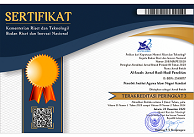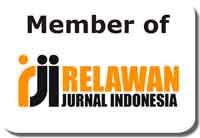Batak Muslim Local Wisdom: Sociological Analysis of Buffalo Slaughtering Tradition of Angkola Community Death Ceremony
Abstract
This research examines the local wisdom built by the Muslim community of Angkola around the ritual of slaughtering buffalo in the event of death ceremony. This study is a field research combining observation, interviews, and document analysis with a sociological analytical technique to evaluate the tradition beginning with the reasons for its adoption, the process, and the desired outcomes. The study’s findings indicate that the Angkola people’s practice of slaughtering buffalo in burial ceremonies is motivated by a desire to preserve traditional culture as well as a means of protecting the social strata of traditional elders. Furthermore, this ritual appears to be a technique of sustaining societal social cohesiveness. The buffalo slaughter served as the foundation for implementing Islamic ideals in an atmosphere of brotherhood and generosity, with Mora Khanggi and Anak Boru serving as the primary funders. The outcomes of the study demonstrate that the practice of local communities as part of life knowledge can be sociologically connected with Islamic theological teachings. Acculturation of culture with religious teachings can genuinely present various choices for propagating religion while also exhibiting theological flexibility in order to make it more welcoming to its devotees.
Keywords
Full Text:
PDFReferences
Auseichyk, Uladzimir. “Features of The Modern Commemoration Rituals of Belarusian Podvinje.” Antropologicheskij Forum 15, no. 41 (June 24, 2019): 123–44. https://doi.org/10.31250/1815-8870-2019-15-41-123-144.
Bangun, Pajung. “Kebudayaan Batak.” In Manusia Dan Kebudayaan Di Indonesia, 20th ed., 55. Jakarta: Djambatan, 2004.
Bungin, Burhan. Metodologi Penelitian Kualitatif (Aktualisasi Metodologis Ke Arah Ragam Varian Kontemporer). Jakarta: Raja Grafindo Persada, 2017.
Depertemen Pendidikan Nasional. Kamus Besar Bahasa Indonesia. 4th ed. Jakarta: PT Gramedia Pustaka Utama, 2008.
Firmando, Harisan Boni. “Orientasi Nilai Budaya Batak Toba, Umat Beragama Di Tapanuli Utara (Analisis Sosiologis).” Studia Sosia Religia 3, no. 2 (2020): 47–69.
———. “Perubahan Sosial Dalam Upacara Adat Kematian Pada Etnis Batak Toba Di Kota Medan.” Universitas Sumatera Utara, 2018.
Hartini, Lilis. “Tradisi Dan Ritual Kematian Di Garut: Sebuah Kajian Dialektologi.” Artikulasi 1, no. 2 (2021): 111–22.
Hidayat, Rahmat. “Construction of Character Education in Mandailing and Angkola Culture in North Sumatra Province.” Society 8, no. 2 (2020): 611–27. https://doi.org/10.33019/society.v8i2.212.
Karim, Abdul. “Makna Ritual Kematian Dalam Tradisi Islam Jawa.” Sabda : Jurnal Kajian Kebudayaan 12, no. 2 (2017): 161. https://doi.org/10.14710/sabda.12.2.161-171.
Kurniawan, Puji. “Akulturasi Hukum Islam Dan Budaya Lokal (Studi Terhadap Tradisi Masyarakat Batak Angkola Padangsidimpuan: Perspektif Antropologi).” Universitas Islam Negeri Syarif Hidayatullah Jakarta, 2014.
Morris Trainor, Zoe, Jonathan Jong, Matthias Bluemke, and Jamin Halberstadt. “Death Salience Moderates the Effect of Trauma on Religiosity.” Psychological Trauma: Theory, Research, Practice, and Policy 11, no. 6 (September 2019): 639–46. https://doi.org/10.1037/tra0000430.
Nuruddin, Sabara. “Islam Dalam Tradisi Masyarakat Lokal Di Sulawesi Selatan.” Mimikri: Jurnal Agama Dan Kebudayaan 4, no. 1 (2018): 50–67.
Pane, Akhiril, Robet Sibarani, Ikhwanuddin Nasution, and Muhammad Takari. “The Performance of Mangupa Tradition in Angkola Custom, Medan, Indonesia.” TAZKIR: Jurnal Penelitian Ilmu-Ilmu Sosial Dan Keislaman 5, no. 2 (2019): 235–52. https://doi.org/10.24952/tazkir.v5i2.2298.
Rahman, Fachrir. “Patuq Dalam Tradisi Kematian Masyarakat Desa Kuta (Sebuah Tinjauan Antropologi Hukum Islam).” Samarah 3, no. 2 (2019): 341–64. https://doi.org/10.22373/sjhk.v3i2.3925.
Rambe, Sutan Raja Pinayungan. “Peranan Pemuka Adat Etnik Angkola Dalam Membangun Kehidupan Sosial Keagamaan Di Desa Sitaratoit Kecamatan Angkola Barat.” IAIN Padangsidimpuan. IAIN Padangsidimpuan, 2014.
Satimin, Satimin. “Nilai-Nilai Filosofis Dalam Memperingati Upacara Hari Kematian Dalam Tradisi Jawa Ditinjau Dari Aspek Sosial (Studi Di Air Banai Kecamatan Hulu Palik Kabupaten Bengkulu Utara).” Manthiq 6, no. 1 (2021): 42–64. https://journal.iainbengkulu.ac.id/index.php/manthiq/article/view/5180.
Syihabuddin, A. “Tradisi Upacara Kematian Pada Masyarakat Nahdhiyyin Dalam Tinjauan Agama Dan Adat.” Al-Adyan 8, no. 1 (2017): 1–27. http://ejournal.radenintan.ac.id/index.php/alAdyan/article/view/523.
Tungkagi, Donald Qomaidiasyah, and Tasya Aziza Mokodongan. “The Polemic of the Tradition of Beating Golomang in Funeral Rituals in the Muslim Community of Bolaang Mongondow.” Pusaka Jurnal Khazanah Keagamaan 10, no. 2 (2022): 392–413.
DOI: http://dx.doi.org/10.31332/ai.v0i0.4575
Copyright (c) 2022 Arbanur Rasyid, Rayendriani Fahmei Lubis, Maulana Arafat Lubis, Nashran Azizan

This work is licensed under a Creative Commons Attribution-NonCommercial-ShareAlike 4.0 International License.










